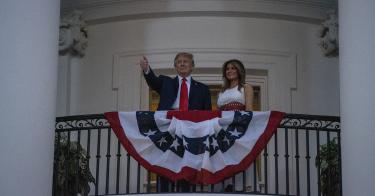Not everyone who hates the president is an insatiable globalist. Some just hate Trump. That doesn’t make them any less wrong, however, particularly when it comes to what the president is doing in places like Syria and Afghanistan.
Many in the media, which recoiled from Bush administration’s muscular policies in the Middle East and South Asia and seemed all too happy to cheerlead Obama’s presumptive withdraws—which left chaos and the rise of ISIS in their wake—now seemed poised to attack Trump at every turn for trying to chart a responsible middle course. Their agenda seems disconnected from facts, more interested in conferring legitimacy on political favorites than asking “who is really getting it right”?
“Never question another man’s motive,” President Dwight D. Eisenhower once said, “his wisdom, yes, but not his motives.” Then, as now, it’s best not to judge people on why they detest their president. Who knows what is really in their hearts? But by all means hold them accountable for their misjudgments that would make us less free, less safe, and less prosperous.
No president tried to be more prudent on matters of foreign and defense policy than Ike. The ultimate goal of his presidency was to muster sufficient resolve to defend America’s interest during the Cold War without turning America into a “garrison state,” a militaristic society that trampled on the freedoms and prosperity of Americans. He tried to craft policies to do that—to restrain military adventurism, pairing reasonable defense budgets with policies intended to protect U.S. interests, as well as deal with pressing challenges here at home, from advancing civil rights to growing jobs and the economy.
Eisenhower’s balancing act was unpacked well in Aaron L. Friedberg’s In the Shadow of the Garrison State: America’s Anti-Statism and Its Cold War Grand Strategy (2000). In addition to battling hopeless leftists willing to turn the world over to the United Nations or surrender to Soviet Premier Joseph Stalin, Eisenhower spent just as much of his presidency pushing off hawks who advocated for everything from preemptive nuclear war to nationalizing the economy.
He famously delivered a parting shot in his farewell presidential address. “We must guard against the acquisition of unwarranted influence, whether sought or unsought, by the military-industrial complex. The potential for the disastrous rise of misplaced power exists, and will persist.”
Notably, Eisenhower never questioned the motives of overzealous generals or demanding captains of industry. He never said they were evil or rapacious or conspiratorial. They were just wrong.
Nor was his speech a clarion call to dismantle either the military or the defense industry. After all, who would defend us without them? What he wanted was for America to take a civics lesson from his presidency. Eisenhower was justifiably proud that for eight years he had successfully reined in the horses of the apocalypse. His speech was meant to be his legacy.
“Only an alert and knowledgeable citizenry can compel the proper meshing of the huge industrial and military machinery of defense with our peaceful methods and goals,” Ike warned, “so that security and liberty may prosper together.”
Trump was born in the shadow of Eisenhower. He was a teenager at the New York Military Academy when Eisenhower died in 1961. There’s no telling what impression that left, but no modern president’s approach to foreign policy looks more like Ike.
Like Eisenhower, Trump has a pretty clear vision and a strategy for what he wants to do. Trump’s is spelled out in his national security strategy.
Trump is anything but an isolationist. A map of the U.S. footprint overseas hasn’t changed that much since he came to office. We’re still in the same places—not because he can’t get us out, but because he accepts we have good reasons to be there.
Nor does Trump hate the military or the defense industry. If anything, he has pumped in resources to make them healthy after the starvation diets of the Obama years.
Trump, however, has made notable shifts in the face of U.S. forward presence. He has relentlessly pressed for friends and allies to do more and carry their fair share of the load (often to their chagrin). He has avoided escalating conflict in the Middle East, Africa and Korea. He has moved boots on the ground around when he thought it necessary. He has found ways to squeeze America’s enemies other than dropping bombs, occupying countries, and changing regimes. On the other hand, he hasn’t been afraid to hit back to protect U.S. interests when need be, crushing the Caliphate and taking out Iranian Maj. Gen. Qasem Soleimani.
Yet every move has engendered relentless criticism. It is no use speculating why they hate Trump. Perhaps they want to fight endless wars or be the world’s policeman.
Maybe they just want political power—whatever Trump’s for, they are against. Maybe they just hate the tweets or his hair or his abrupt and abrasive manner.
Whatever the reason, what matters in the end is that they’re wrong.
What we need now is a prudent balance of American power and interests—one that steels us for the long struggle of great power competition. And that is something Trump has proven he’s willing to pursue.
This piece originally appeared in The Daily Caller




